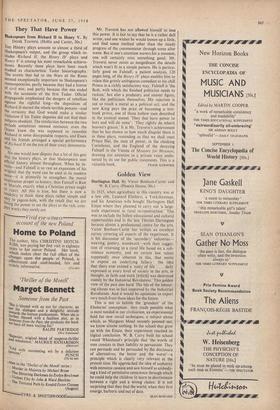They That Have Power
THE History plays amount to almost a third 'of Shakespeare's output, and the group which in- cludes Richard II, the Henry IV plays and Henry V is among his most remarkable achieve- ments. Recently these plays have been much studied as characteristic Tudor historiography. The events that led to the Wars of the Roses seemed exceptionally important to Shakespeare's contemporaries, partly because they had a horror of civil war, and partly because this one ended With the accession of the first Tudor. Official propaganda emphasised the dangers of rebellion against the rightful king—the deposition of Richard II started the whole terrible process—and the certainty that God would make a similar visitation if his Tudor deputies did not find their subjects obedient. The similarities between the two Periods sometimes seemed ominous; even the Queen knew she was supposed to resemble Richard in some disreputable respects, and Essex and his friends arranged a special performance of Richard Ii on the eve of their crazy demonstra- tion.
No one would now dispute that a lot of this gels into the history plays, or that Shakespeare uses official history almost throughout. When he in- vents—and Falstaff is so vast an expansion of his original that the word can be used in its modern sense—it is primarily to strengthen the moral ImPlication proper to history; thus Falstaff is Riot
Or Misrule, exactly what a Christian prince ought to , reject. All this is true, but there is now a
tendency to think these plays rather simple and easy to pigeon-hole, with the result that we are losing the power to'see the plays as the rich, com- plex works they surely are. Mr. Traversi has not allowed himself to lose this power. It is fair to say that he is a rather dull writer, and one wishes he would loosen up a little, and find some method other than the steady progress of the commentator through scene after scene. But if one's attention wavers for a moment, one will certainly miss something good. Mr. Traversi never omits as insignificant the details which won't fit in a simple pattern. He is particu- larly good on Falstaff; a patient analysis, 120 pages long, of the Henry IV plays enables him to relate this grimly ambiguous comedian to his chill Prince in a richly satisfactory way; Falstaff is 'the flesh, with which the finished politician needs to reckon,' but also a predatory and sinister figure, like the politicians themselves. His rejection is not so much a moral as a political act; and the new King pays the price of becoming a text- book prince, one of those hollow men described in the ironical sonnet 'They that have power to hurt and will do none' : 'They rightly do inherit heaven's graces.' It is Mr. Traversi's achievement that he has shown us how much disquiet there is in these plays, reminding us that we shall meet Prince Hal, the man of power, in the clanking Coriolanus, and the England of the decaying Falstaff in the Vienna of Measure for Measure; drawing our attention to a private voice undis- torted by its use for public statements. This is a


































 Previous page
Previous page